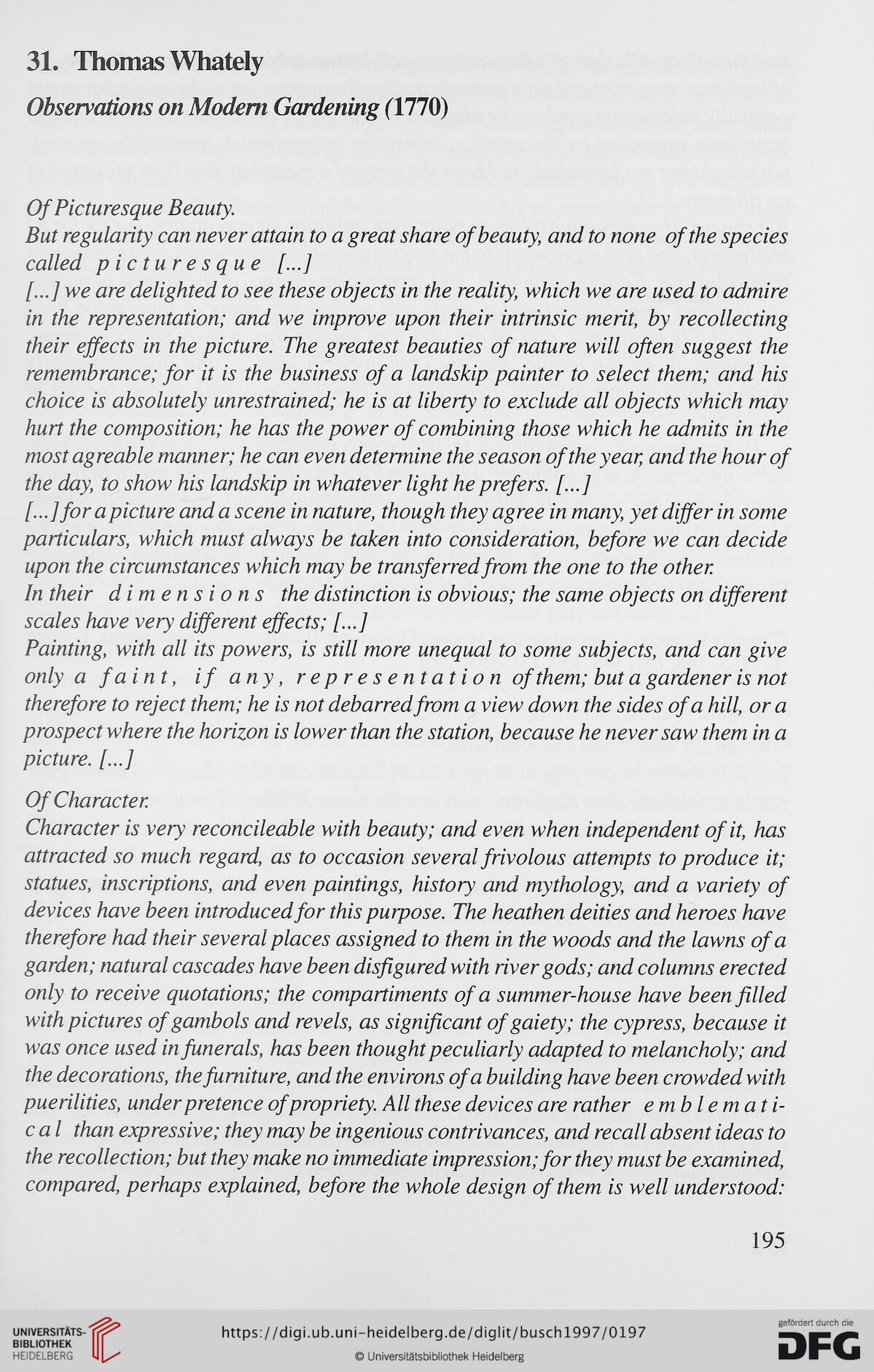31. Thomas Whately
Observations on Modem Gardening (1770)
Of Picturesque Beauty.
But regularity can neverattain to a great share ofbeauty, and to none ofthe species
called picturesque [...]
[...] we are delighted to see these objects in the reality, which we are used to admire
in the representation; and we improve upon their intrinsic merit, by recollecting
their effects in the picture. The greatest beauties of nature will often suggest the
remembrance; for it is the business of a landskip painter to select them; and his
choice is absolutely unrestrained; he is at liberty to exclude all objects which may
hurt the composition; he has the power of combining those which he admits in the
most agreable männer; he can even determine the season ofthe year, and the hour of
the day, to show his landskip in whatever light he prefers. [...]
[...]for a picture and a scene in nature, though they agree in many, yet diff er in some
particulars, which must always be taken into consideration, before we can decide
upon the circumstances which may be transferred from the one to the other.
In their dimensions the distinction is obvious; the same objects on different
scales have very different effects; [...]
Painting, with all its powers, is still more unequal to some subjects, and can give
only a faint, if any, r ep r e s e n ta t i ο n of them; buta gardener is not
therefore to reject them; he is not debarredfrom a view down the sides ofa hill, or a
prospect where the horizon is lower than the Station, because he never saw them in a
picture. [...]
OfCharacter.
Character is very reconcileable with beauty; and even when independent ofit, has
attracted so much regard, as to occasion several frivolous attempts to produce it;
statues, inscriptions, and even paintings, history and mythology, and a variety of
devices have been introducedfor this purpose. The heathen deities and heroes have
therefore had their several places assigned to them in the woods and the lawns ofa
garden; natural cascades have been disfigured with rivergods; and columns erected
only to receive quotations; the compartiments of a summer-house have beenfilled
with pictures of gambols and revels, as significant ofgaiety; the cypress, because it
was once used in funerals, has been thoughtpeculiarly adapted to melancholy; and
the decorations, thefumiture, and the environs ofa building have been crowded with
puerilities, under pretence ofpropriety. All these devices are rather emblemati-
cal than expressive; they may be ingeniouscontrivances, andrecallabsentideas to
the recollection; but they make no immediate impression; for they must be examined,
compared, perhaps explained, before the whole design of them is well understood:
195
Observations on Modem Gardening (1770)
Of Picturesque Beauty.
But regularity can neverattain to a great share ofbeauty, and to none ofthe species
called picturesque [...]
[...] we are delighted to see these objects in the reality, which we are used to admire
in the representation; and we improve upon their intrinsic merit, by recollecting
their effects in the picture. The greatest beauties of nature will often suggest the
remembrance; for it is the business of a landskip painter to select them; and his
choice is absolutely unrestrained; he is at liberty to exclude all objects which may
hurt the composition; he has the power of combining those which he admits in the
most agreable männer; he can even determine the season ofthe year, and the hour of
the day, to show his landskip in whatever light he prefers. [...]
[...]for a picture and a scene in nature, though they agree in many, yet diff er in some
particulars, which must always be taken into consideration, before we can decide
upon the circumstances which may be transferred from the one to the other.
In their dimensions the distinction is obvious; the same objects on different
scales have very different effects; [...]
Painting, with all its powers, is still more unequal to some subjects, and can give
only a faint, if any, r ep r e s e n ta t i ο n of them; buta gardener is not
therefore to reject them; he is not debarredfrom a view down the sides ofa hill, or a
prospect where the horizon is lower than the Station, because he never saw them in a
picture. [...]
OfCharacter.
Character is very reconcileable with beauty; and even when independent ofit, has
attracted so much regard, as to occasion several frivolous attempts to produce it;
statues, inscriptions, and even paintings, history and mythology, and a variety of
devices have been introducedfor this purpose. The heathen deities and heroes have
therefore had their several places assigned to them in the woods and the lawns ofa
garden; natural cascades have been disfigured with rivergods; and columns erected
only to receive quotations; the compartiments of a summer-house have beenfilled
with pictures of gambols and revels, as significant ofgaiety; the cypress, because it
was once used in funerals, has been thoughtpeculiarly adapted to melancholy; and
the decorations, thefumiture, and the environs ofa building have been crowded with
puerilities, under pretence ofpropriety. All these devices are rather emblemati-
cal than expressive; they may be ingeniouscontrivances, andrecallabsentideas to
the recollection; but they make no immediate impression; for they must be examined,
compared, perhaps explained, before the whole design of them is well understood:
195




